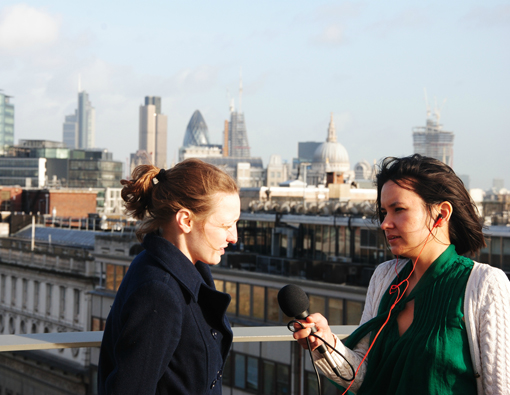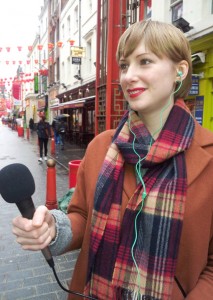London Scool of Economics turns on to Audio
London Scool of Economics turns on to Audio
 About the author: Cheryl Brumley is Multimedia Editor of the LSE Review of Books. Cheryl joined the PPG in January 2012 after graduating from the LSE with an MSc in Theory and History of IR. Cheryl previously conducted research into social media and the Arab Spring at the Regional Centre for Conflict Prevention in Jordan, and researched for BBC World Service radio on work experience.
About the author: Cheryl Brumley is Multimedia Editor of the LSE Review of Books. Cheryl joined the PPG in January 2012 after graduating from the LSE with an MSc in Theory and History of IR. Cheryl previously conducted research into social media and the Arab Spring at the Regional Centre for Conflict Prevention in Jordan, and researched for BBC World Service radio on work experience.
In his book The Third Ear, German music journalist and jazz producer Joachim-Ernst Berendt writes that we must aspire to ‘a democracy of the senses’. In Berendt’s opinion our ears should serve a primary guide, in spite of our visually obsessed modern age.
Although we didn’t explicitly take on the lofty task of supplanting the visual with the aural, the LSE Review of Books Podcast did set out to challenge the idea that an academic podcast was simply a speaker in front of a microphone. Sound in its many forms can be used to enrich the listener’s understanding of a subject, in our case the various facets of the social sciences, by incorporating techniques and formats from radio broadcasting.
 Since May 2011, the LSE Review of Books has created six, bi-monthly podcasts all featuring three interviews with notable authors and academics. We have covered wide-ranging topics: linguistics, feminism, Marxism, urban planning and the Olympics, democratisation, and China’s global diaspora. The podcasts grew out of the success of the LSE’s THE (Times Higher Education) Award-winning Public Policy Group (PPG) blogs. The main aim of the podcasts sits closely alongside those of the LSE Review of Books and the PPG’s three other blogs: to encourage public engagement with, and understanding of, the social sciences. Funded by the Higher Education Innovation Fund (HEIF 5), the podcasts are part of our goals of innovation and knowledge exchange between experts within and outside universities, and to open up academic research so as to increase its impact.
Since May 2011, the LSE Review of Books has created six, bi-monthly podcasts all featuring three interviews with notable authors and academics. We have covered wide-ranging topics: linguistics, feminism, Marxism, urban planning and the Olympics, democratisation, and China’s global diaspora. The podcasts grew out of the success of the LSE’s THE (Times Higher Education) Award-winning Public Policy Group (PPG) blogs. The main aim of the podcasts sits closely alongside those of the LSE Review of Books and the PPG’s three other blogs: to encourage public engagement with, and understanding of, the social sciences. Funded by the Higher Education Innovation Fund (HEIF 5), the podcasts are part of our goals of innovation and knowledge exchange between experts within and outside universities, and to open up academic research so as to increase its impact.
I find the ‘magazine-style’ format of our podcasts allows for a more dynamic and profound portrait to emerge from beneath intimidating academic subjects. For instance, in our first episode on linguistics we uncovered the curiosities of an Amazonian language with Professor Dan Everett, and we also heard from poet Philip Gross about the effects of father’s degenerative speech disorder, a devastating development in the life of a once-gifted polyglot. The range of angles covered around any one theme makes for a rewarding planning process – one that challenges us to wed different academic or other specialists to one another, and which produces a sum greater than its parts.
… the main aim of the podcasts is to encourage public engagement with, and understanding of, the social sciences
Textured wildtrack, and lively stings, plays an integral role in each podcast. In our fourth episode, pegged to the London Olympics, we had the fortune of speaking to author Iain Sinclair as we walked through Hackney’s London Fields, towards the nearby Regent’s Canal. As we moved from the Fields to Broadway Market, Iain started to address the lightning forge of changes to East London, until he was cut off by the pulsating noise of a jackhammer, and the harsh interjection of motor-saws, from neighbouring construction sites. The parallels between the soundscape and the content of the interview, though never referenced explicitly, made for a richer experience and contextualised Iain’s arguments about imposed urban planning.
The final ‘Academic Inspiration’ segment in each podcast is based on a popular series written on the LSE Review of Books blog where academics tell us what books inspired them into their subject. This portion of the podcast can be unexpectedly moving, as was the case in the Olympics episode where LSE Cities academic, Dr Suzi Hall, transported us to her native South Africa. She introduces us to a time and place where travel was prohibitively expensive, but then describes how she was able to nourish her early interest in architecture by leafing through beautifully photographed books on European cities. In this series, academics are also very willing to show a more personable side. For example, LSE Centennial Professor Mary Evans revealed in our feminism and gender episode that Scandinavian crime novels provide an exciting escape from the occasional banalities of academic life.

Cheryl Brumley interviews an LSE member of staff for a podcast.
As Digital Editor, I am responsible for producing and editing the podcasts. My colleague Amy Mollett, Managing Editor of the LSE Review of Books blog, lends her voice as host, and works closely with me to develop the themes, bid for guests, and conduct interviews. We tend to develop topics around academic subjects that have proven successful on the blog. We also benefit greatly from the LSE’s active events programme and our central London location, making face-to-face interviews with far-flung guests a possibility on a limited budget.
The most challenging part of podcasting in a busy university (without an in-built studio) is the limited availability of empty, quiet rooms, free of cave-like echoes, and far from the ambient chatter of neighbouring classrooms. A big feature of our the LSE blog ethos is open access, which can often limit the choices for music and stings, but this is easily rectified as there are an endless array of Creative Commons websites that produce professional-sounding music for seemingly every tone and hue required.
The podcasts are hosted on several different forums including our LSE Review of Books blog, the podcast channel on the LSE website, and iTunes U. We are seeing a growing interest from users on Soundcloud, having just surpassed 1,000 listens for a single episode, as the site transitioned from beta to a fully live site. The rich media team at LSE help us upload our podcasts on to the different web platforms and provide us with the latest statistics on listens and downloads.

Amy Mollett collecting vox pops in Chinatown.
The link between the podcasts and our books blog allows for even greater innovation in the way we are able to incorporate sound into everyday blogging. In our most recent episode on China and its global diaspora, Middlesex University researchers Rosemary Sales and Xia Lin walked us through London’s Chinatown to uncover the area’s sociological complexities. The interview provided a wealth of material that ultimately didn’t make the final edit for the podcast. However, these cuts did were useful for an interactive feature I developed where I pinned specific points of interest, like the pagoda or the stone lions, onto Google Maps, and then linked each pin to a YouTube extract that played relevant clips and a slideshow of pictures taken on the day.
Due to the early success of the LSERB podcasts, we are rolling out similar ‘magazine-style’ podcasts on our sister blogs, European Politics and Policy at LSE (with an already produced and named series – voxEUROPP), British Politics and Policy at LSE and also on our Impact of Social Sciences blog. I take the time to train members of our blog team in microphone and interview techniques to ensure we maintain a consistent quality of sound. voxEUROPP has gained a sizeable audience in its first episode on the rise of the far right in Europe, and we will soon release another featuring Noam Chomsky.
As I wrote in a recent blog post, if academic study is about real people, places and events, then why not bring academia to the streets? We do many interviews in staid university rooms, but we feel most comfortable escaping the confines of our campus to interview academics and authors in the real-world spaces they seek to explain in their day-to-day research.
In an essay on sound, inspired by Berendt’s take on the senses, sociologist Michael Bull and Les Back say, ‘Thinking with our ears offers an opportunity to augment our critical imaginations, to comprehend our world and our encounters with it according to multiple registers of feeling.’ As universities pay heed to the coming Research Excellence Framework and consider the best methods of increasing impact, the combination of podcasting and the wide-reach Internet platforms provide could prove a rewarding way forward. The social sciences are rich with stories and no doubt innovative uses with sound can help bring these stories to life.
To listen to the podcasts visit: http://blogs.lse.ac.uk/lsereviewofbooks/podcasts/
Cheryl Brumley

 Learning on Screen
Learning on Screen